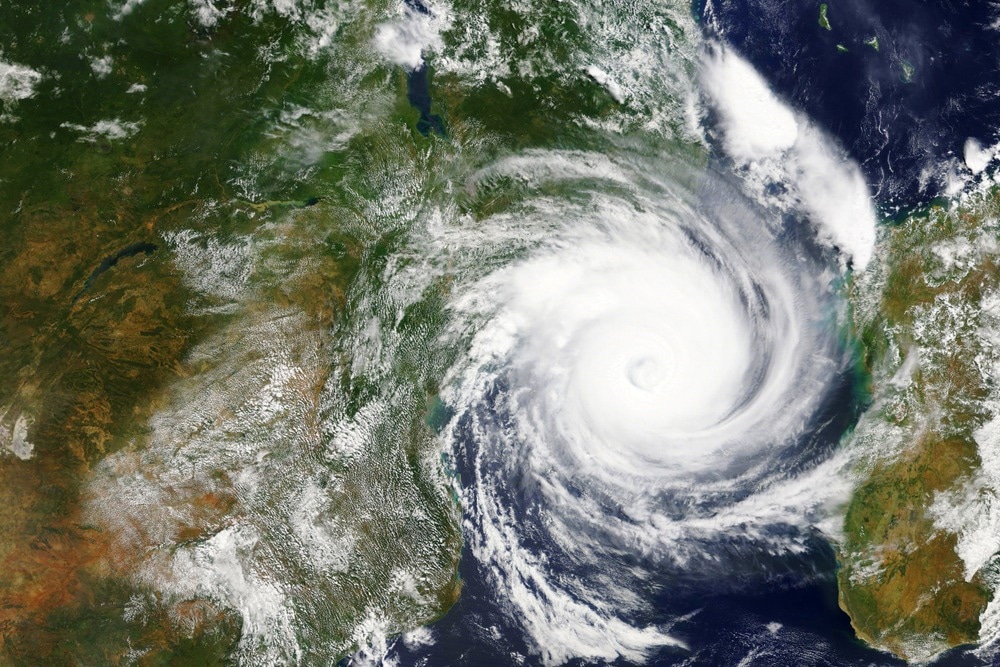The strong winds and torrential rains that follow a cyclone cause significant damage to ecosystems, making them more vulnerable to future wildfires. As powerful cyclones become increasingly common, scientists investigated the links between cyclones and forest fires, how they fuel one another, and why fires may burn in unexpected areas in the future.

Image Credit: lavizzara/Shutterstock.com
The study was published in the journal Trends in Plant Science on October 13th, 2022.
Rainforests, for instance, are wet by definition, which makes them resistant to fire. But when they are disturbed by cyclones, it can allow fire to spread into those ecosystems. To have a fire, we need three things: fuel to burn, dry enough micro-climate, and a source of ignition. Cyclones can affect all three elements.
Thomas Ibanez, Study Lead Author and Plant Ecologist, French National Research Institute for Sustainable Development
Cyclones are storms that form in the South Pacific or Indian Oceans, and they bring severe rains, storm surges, and gale-force winds, similar to hurricanes in the Atlantic or typhoons in the Northwestern Pacific. Strong cyclones can bring winds that exceed 200 km per hour, causing forest damage and preparing them for forest fires.
When the wind from a cyclone blows, it damages trees, bringing down a lot of leaves, twigs, branches, and logs to the ground, which make great fuel for future fire. Wind also opens the canopy, bringing more light in the undergrowth, which can promote the growth of grasses or bushes that also make good fuel. Also, when the canopy is opened, it makes the undergrowth drier because the canopy usually shades it from the sun and locks in moisture.
Thomas Ibanez, Study Lead Author and Plant Ecologist, French National Research Institute for Sustainable Development
Cyclones may also indirectly enhance the occurrence of human-generated ignition by making forests attractive locations for agricultural activity.
Ibanez, who is working with the University of Montpellier, explains, “This phenomenon is common where people depend on slash-and-burn agriculture or forest resources for livelihoods. After cyclones, damaged forests may be burned to provide ash beds for planting new crops and for easier access to forest resources.”
Not only do cyclones increase the likelihood of fire, but fires may also alter how cyclones affect forests.
Of course, fire cannot directly affect the likelihood of cyclones, because the cyclones originate from oceans, but they can affect the response of the ecosystem to cyclones. If you have a fire, it can make the trees weaker to resist cyclone winds or it can kill trees and promote the regrowth of trees that are less resistant to cyclones.
Thomas Ibanez, Study Lead Author and Plant Ecologist, French National Research Institute for Sustainable Development
In some areas where large cyclones and fires have historically occurred, the occurrences are a natural part of preserving the land.
Ibanez notes, “In cyclone-prone regions, there are also ecosystems that are adapted to frequent cyclones and fires, and interactions between these disturbances actually maintain original and species-rich ecosystems. In these ecosystems, human activities that reduce fire, such as land use change and fire suppression, can threaten the stability of the ecosystem and cause biodiversity loss.”
However, as temperatures continue to rise and the strength of extreme weather events like cyclones increases due to climate change, the storms are expected to make landfall in areas they never have before. Ibanez and his associates hope to keep researching cyclone–fire interactions.
“We would like to better understand how this phenomenon varies by location. We could then predict with climate change which places would be more likely to be affected by these changes. An important component of global change is that ecosystems do not face just one disturbance, but a mix of several disturbances, and the interaction between new disturbances can result in unexpected effects,” concludes Ibanez.
Journal Reference:
Ibanez, T., et al. (2022) Altered cyclone–fire interactions are changing ecosystems. Trends in Plant Science. doi.org/10.1016/j.tplants.2022.08.005.